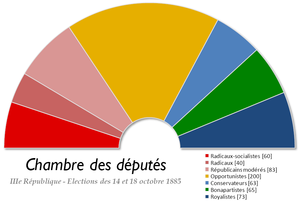French legislative election, 1885
|
|
|||||||||||||||||||||||||||||||||||||
|---|---|---|---|---|---|---|---|---|---|---|---|---|---|---|---|---|---|---|---|---|---|---|---|---|---|---|---|---|---|---|---|---|---|---|---|---|---|
|
|||||||||||||||||||||||||||||||||||||
|
All 584 seats to the Chamber of Deputies |
|||||||||||||||||||||||||||||||||||||
|
|||||||||||||||||||||||||||||||||||||

Composition of the Chamber of Deputies
|
|||||||||||||||||||||||||||||||||||||
|
|||||||||||||||||||||||||||||||||||||
The 1885 general election was held on 14 and 18 October 1885.
Following the deaths of Napoléon, Prince Imperial and the Comte de Chambord, the monarchists and Bonapartists formed a Conservative Union under the leadership of the Baron de Mackau. In the first round of the election, the conservatives won 176 seats, whereas the Republicans - partly because radical and moderate Republicans ran against each other, underestimating the danger from the right - only won 127. However, in the second round the radical and moderate Republicans agreed that the worse-placed Republican candidates would withdraw, and Republicans won 244 seats to the conservatives' 25, leading to a Republican victory.
Henri Brisson remained premier immediately after the election, but resigned in December following his defeat in the presidential election to the incumbent, Jules Grévy. Brisson was replaced as premier by Charles de Freycinet.
...
Wikipedia



